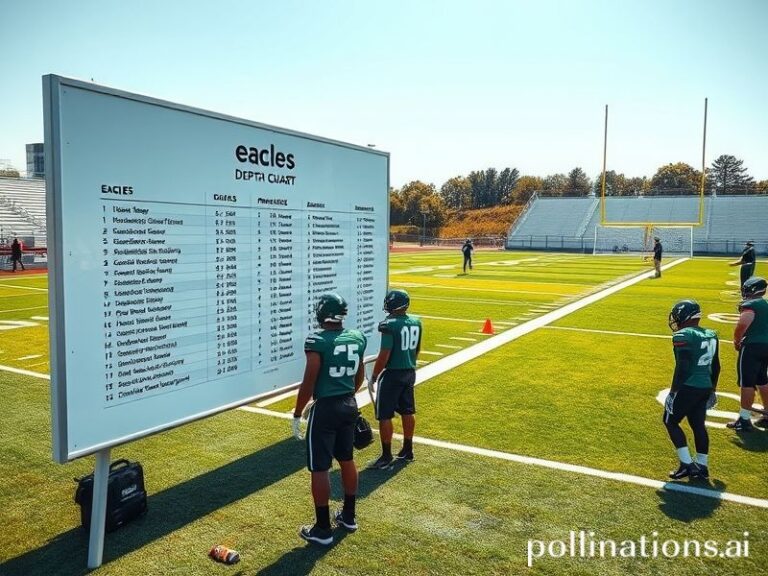Global Hayride: How Riley Green’s Red-Dirt Tour Accidentally Became the World’s Cheapest Diplomatic Summit
Riley Green’s Tour: How a Red-Dirt Bard from Alabama Accidentally Became a Global Soft-Power Asset
By Dave’s Locker, Foreign Bureau
There are moments—rare, fleeting, and usually soundtracked by steel guitar—when the American South leaks into the wider world, and the wider world, baffled, decides it likes the taste. Enter Riley Green, the former University of Alabama quarterback turned neo-honky-tonk troubadour, who this summer is dragging his “Way Out Here 2024” tour through 42 cities on four continents. What began as a polite excuse to sell beer in hockey rinks has metastasized into something diplomats might call “cultural engagement,” provided they’ve had enough bourbon.
From the outside, Green’s itinerary looks like a drunken dartboard: Jacksonville, Florida; Oslo; Sydney; Bogotá; back to Jacksonville Beach, Florida—because nothing says “global cohesion” like repeating the same zip code with a sunburn. Yet each stop is less about the man himself and more about the cargo he carries: stories of front-porch nihilism wrapped in a melody so stubbornly optimistic it could coax a smile from a Bundesbank economist. In other words, Green is exporting the post-2016 American myth that somewhere, somehow, there’s still a gravel road untainted by algorithmic rage.
Europeans, who’ve spent the decade trying to decide whether to fear or pity the United States, treat the shows as living dioramas. In Stockholm, fans who pronounce “y’all” like it’s a rare cheese nevertheless belt out “I Wish Grandpas Never Died” with the fervor of parishioners. Swedish public radio called it “therapeutic nationalism,” which is either high praise or the most passive-aggressive Nordic insult since ABBA. Meanwhile, in London, Brexit-weary patrons discover that line-dancing is the rare hobby that requires no customs paperwork—just rhythm and a willingness to overlook fiscal reality.
The Pacific leg is where things tilt geopolitical. Australia, desperate for any distraction from its own climate inferno, embraces Green’s odes to kudzu and catfish as escapism. New Zealand, ever the adult in the room, sends a cultural attaché to the Auckland gig to determine whether country music qualifies as a greenhouse gas. (Verdict: inconclusive, but the confetti cannons are single-use plastic.) Then it’s off to Japan, where promoters bill the concert as “American Neo-Traditional Soul Searching—With Beer!” Ticket sales rival those of a mid-tier J-pop band, proving once again that Japanese consumers can monetize existential longing faster than Silicon Valley can mint NFTs.
Latin America adds the final brushstroke to this accidental soft-power mural. In Mexico City, a crowd of 12,000 sings every word to “Different ‘Round Here,” a song that, lyrically, is about Alabama high-school football yet somehow maps perfectly onto Friday-night fútbol in Coyoacán. A Colombian journalist asks Green whether he realizes his songs are being adopted as anthems for rural broadband activists. He shrugs, grins, and says, “Long as they’re drinkin’, I’m singin’.” Somewhere in the State Department, an intern updates a PowerPoint titled “Non-Traditional Influence Vectors” and wonders if tuition reimbursement covers existential dread.
The cynical read—our specialty—is that Green’s tour is merely the latest proof that late capitalism can commodify anything, even nostalgia for a past that never existed. The less cynical read is that in a year when half the planet is voting and the other half is rioting, a three-chord confession about granddad’s pocketknife still feels like truce. Both reads are true, which is why the merch line snakes around the block in every hemisphere. T-shirts read “Way Out Here,” but the subtext, translated into seventeen currencies, is “Anywhere but here.”
When the last amp powers down in Dublin this October, Green will fly home to Alabama, mission technically unaccomplished: no treaties signed, no supply chains rerouted, no GDP uptick traceable to banjo. And yet, for a brief season, a man who sings about dirt roads somehow widened them—at least in the collective imagination of a world that’s running out of places to park its anxiety. Call it soft power, call it denial, call it a Tuesday. Just tip the bartender; she’s got student loans in three time zones.







